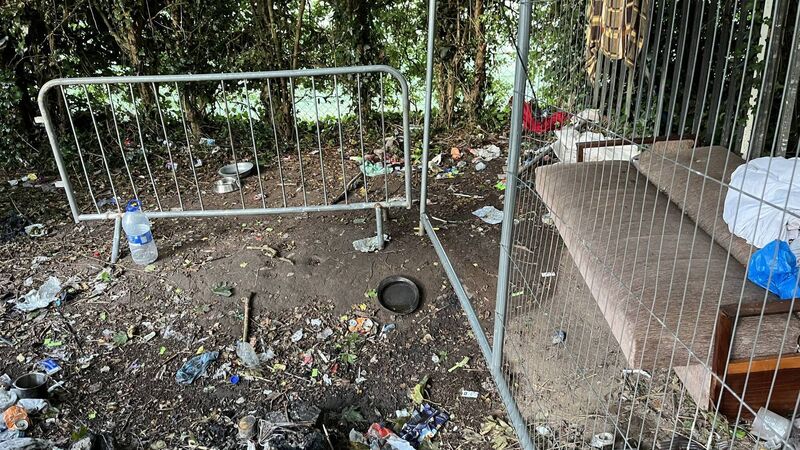Mobile supervised injection facility may be considered for Cork city

A drug den located close to Cork city centre and adjacent to a public park. Picture: Donal O'Keeffe
The Cork minister with responsibility for the National Drugs Strategy has said the option of a mobile supervised injection facility (SIF) may be considered for the city.
It comes as The Echo today reports on an open-air ‘drug den’ adjacent to a busy city centre park.
The makeshift shelter has been constructed using repurposed street fencing and plastic sheeting.
A barren patch of ground littered with used needles, spoons, and crumpled lengths of tinfoil, pocked with the burnt remnants of multiple fires, was also located in the area.
Colm Burke, Fine Gael TD for Cork North-Central and minister of state at the Department of Health, told The Echo that a pilot scheme involving a SIF in Dublin was currently in the process of being introduced.
He said no decision would be made regarding a similar facility in Cork until the progress of the Dublin facility could be assessed.
“In Dublin, the building work started in early August to provide a supervised injection facility,” he said.
“My department will be issuing licence for that, and we have to make sure all the T’s are crossed and the I’s are dotted in relation to the premises itself and in relation to the supervision that would be provided.”
“That will be then under review and it would probably be a full 18 months before we’ll have a full review about how it’s working out.”
Asked if Cork would get a SIF, he replied: “That won’t happen until such time as we see how best to run them.
“Now there is a proposal being made to me about having a mobile supervised facility, and our main priority is getting the supervised facility in Dublin up and running, and we may very well look at the mobile facility as well, but at the moment no decision has been taken on that, but [a mobile facility] is what has been talked about for Cork,” said Mr Burke.
'A piece of the jigsaw puzzle'
Fianna Fáil city councillor and former Lord Mayor of Cork, Colm Kelleher, said he had been part of a multi-agency delegation which visited both a fixed and mobile SIF in Lisbon last year.
“I would be in favour of a mobile SIF to start with,” Mr Kelleher said.
“Kit out a transit van, and it’s got all the requirements on board — Naloxone, which is an antidote to an overdose, clean needles — it’s something that is tried and tested the world over.
“It’s all about the prevention of transmissible diseases, hepatitis, or HIV.
“And it’s also about the reduction of drug litter, which is very apparent in some areas across the city.”
Mr Kelleher said he did not believe a SIF could be “a silver bullet” to address drug addiction, but “it is a big piece of the jigsaw puzzle”.
Beside an open-air drug den close to the city centre, one person struggling with addiction spoke about why he thinks Cork needs a supervised injection centre.
The makeshift shelter is located in an overgrown patch of waste ground.
Alongside a couch is a barren patch of ground littered with used needles, spoons, and crumpled lengths of tinfoil, pocked with the burnt remnants of multiple fires, and strewn with several used sleeping bags and duvets.
Discarded tent rods are scattered all over the ground, while a small black disposable ‘sharps box’ sits beside the couch.
The drug den is located close to where 53-year-old father-of-one Timmy Hourihane was fatally injured in October 2019 when he was attacked near his tent, repeatedly kicked and stamped upon, before dying later in hospital.
It is also situated close to a public park, where children play, and is easily accessible through a metal fence which has had its vertical bars forced apart.
Kevin [not his real name] is 32 and is currently staying in a tent not far from the drug den.
He has been an addict, he said, for almost a decade.
He has lost access to his children, he said, because he is homeless, and he cannot get accommodation in the city because he is from the county.
When he speaks to The Echo, late on a weeknight in the park, Kevin is in company with five friends who are also homeless.
Of the six people, Kevin is sober and reasoned, speaking calmly and thoughtfully while his companions were all in various stages of intoxication.
'Centre would save lives'
Kevin believes that a supervised injection facility would save lives in Cork.
“It would be safe, there would be less ODs [overdoses], there would be clean needles, meaning the spread of disease would go down,” he says.
One of Kevin’s companions, ‘Jack’, repeatedly shouts that he is against an injection centre because it would normalise drug abuse, before saying there are pros and cons in every situation.
Kevin added: “I’m assuming it would be medically supervised, which would be brilliant because it would bring down the number of deaths massively; the violence, I reckon, would be taken out of it — the robberies, people getting beaten up and robbed, will be taken out of it.
“You don’t have to worry about your brother or your mother or whoever it is going through an addiction at the time, you don’t have to be worried [about them], because most people going to inject are going into a ditch, they’re going into a quiet corner,” Kevin says.
“If they overdose, they’re there for days before anyone finds them, whereas if there’s a safe injection clinic and something happens, they’re able to be revived straight away.
“It’s safe, it stops the spread of dirty needles, it stops many, many diseases being spread.
“I think it’s a very good idea, and it’s something we really, really need in this town.”
Kevin adds that it is essential that any such SIF works in conjunction with a treatment programme.
“Something that starts at the bottom on basic, you work your way up to standard and then to enhanced, and then enhanced would lead on to a treatment centre,” he said.
“You don’t want an injection centre where people come in and that’s it — you want people to know that if they work hard enough, the medical staff will be there to help them get off of it.
“Instead of treating people in addiction like animals who get their fix and that’s it, leave them to it, we want to work together and fix the problem of their addiction.”










 App?
App?


